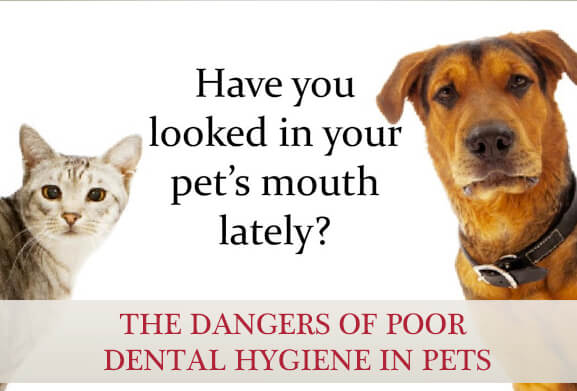Have you ever taken a look inside your pet’s mouth? If you do, you might be surprised at what you see. Oral health problems are a struggle for both dogs and cats. An estimated 80 percent of dogs have significant oral problems, and their owners have no idea that their pets are suffering. Cat owners are surprised to learn that around 70 percent of all cats have significant oral health problems by the age of three.
Unfortunately, if you are not being proactive to take care of pet dental care routines, your pet probably has an oral health concern. When a veterinarian points out these painful problems, most owners exhibit genuine surprise and shock. As a responsible pet owner, you owe it to yourself to know what oral hygiene problems can crop up in your pet, how they affect his or her health and what you can do about them.
Common Oral Health Problems in Pets with Poor Oral Hygiene
If you ignore your dog or cat’s teeth, they will develop oral health problems that are painful and dangerous. Some common problems include:
- Gingivitis – Inflammation of the gums that can be painful for your pet.
- Periodontitis – General disease in the oral cavity that attacks both the gums and the teeth.
- Pyorrhea – Inflammation in the gums and the tooth sockets, which can cause the teeth to loosen and create puss around the tooth.
- Caries – Decalcification of the tooth enamel that leads to cavities. While rare in dogs, they can happen.
- Plaque – Buildup of bacteria, cells and polymers on the teeth often at the gum line.
- Tartar – Calcium carbonate and calcium phosphate combined with plaque that creates a hard buildup on the teeth.
- Feline odontoclastic resorption lesions – Painful lesions that eat away at healthy oral tissue and lead to tooth destruction in cats.
- Oral cancers – Oral cancers can affect both dogs and cats, and if they are not found quickly, they can be fatal.
- Gingivostomatitis – Inflammatory condition of the oral tissue causing red, swollen tissue that bleeds easily. This condition affects cats.
How do these conditions occur? In both dogs and cats, the most common cause of these problems is plaque and food that is not removed from the teeth and gums through proper oral hygiene. Over time, that plaque and food that is left behind in the pet’s mouth creates a breeding ground for bacteria, which in turn cause inflammation and irritation. Once the irritation and inflammation sets in, the pet’s oral health is compromised, and your pet will begin to suffer.
Dangers of Oral Health Problems Beyond the Mouth
The obvious dangers of oral health problems, including tooth loss and irritation in the mouth, are not the only problems that oral disease can cause. When the mouth is chronically diseased, the inflammation can spread to other areas of the body. The toxins from the oral diseases are absorbed into the pet’s bloodstream, passing into the rest of the body. If the disease in the mouth is not treated and prevented, the animal can suffer from other health conditions as a result, as the toxins spread to the kidney, heart and brain.
Keeping Your Pet’s Teeth Clean and Healthy
To avoid these problems, you must pay attention to oral hygiene for your pet. Oral hygiene starts with the right food. Choose a pet food that is well-balanced and primarily meat-based. Dry food can help limit problems, as it does not stick to the teeth as easily. Your veterinarian can help you select a food that is ideal for your dog or cat.
Then, provide your pets with chew treats that require them to exercise their teeth. Rawhide bones for dogs, for instance, encourage chewing behaviors that loosen plaque buildup. Finally, establish a brushing routine that gives you the chance to brush your pet’s teeth on a regular basis. Brushing a dog’s teeth or brushing a cat’s teeth is not an easy task, especially at first, but you will find it well worth the effort when your pet has better overall health.
At-home pet dental care is crucial to keep your pet’s teeth clean and healthy, but don’t neglect routine oral care at the vet. Schedule cleanings at least once a year to ensure that your pet’s teeth get a deep down clean from a pet healthcare professional.
If your pet is due for a teeth cleaning, Centre Street Animal Hospital is ready to help. Contact us to schedule a cleaning today, and take measures to protect your pet’s oral health, which will also help protect his or her overall health and comfort. Don’t forget that February is national pet dental health month, and our current promotion ends March 12.

